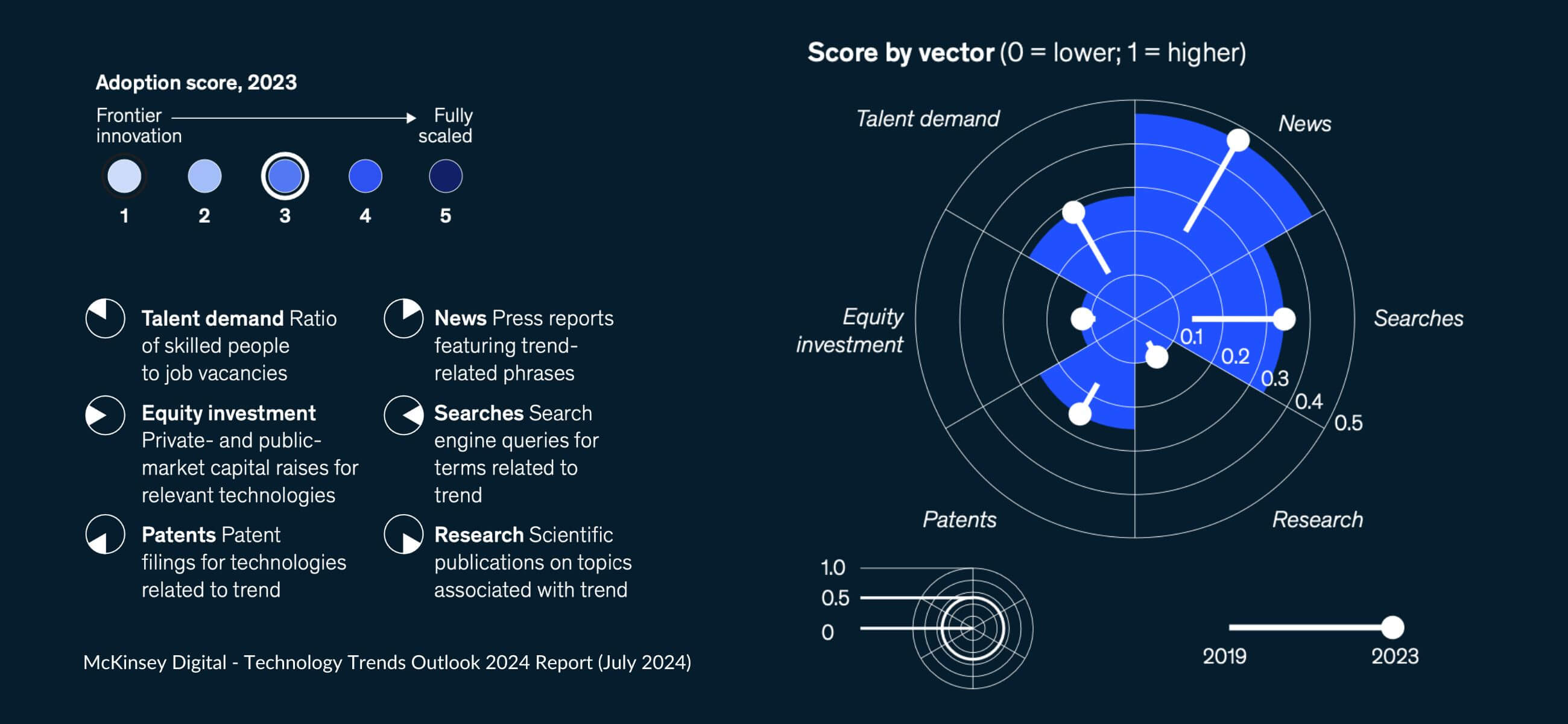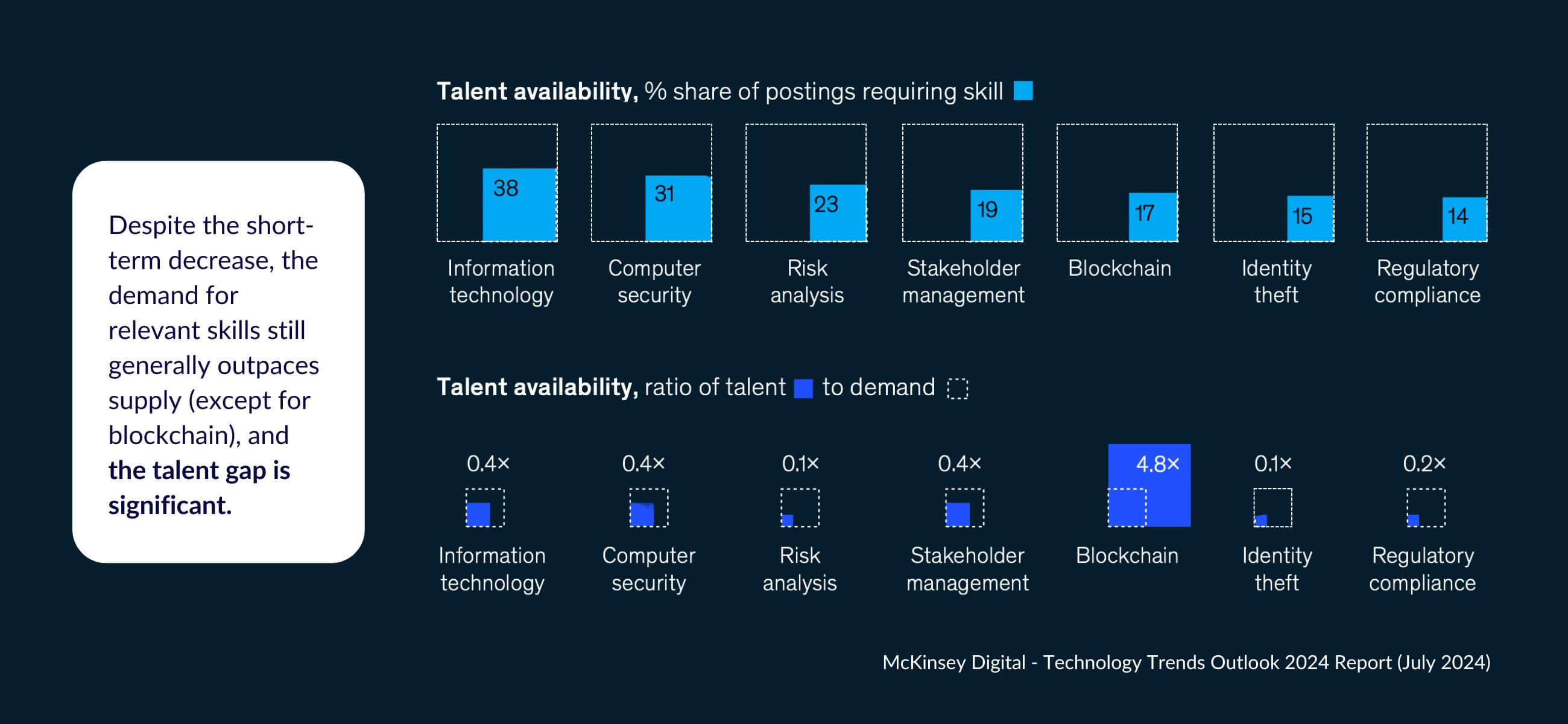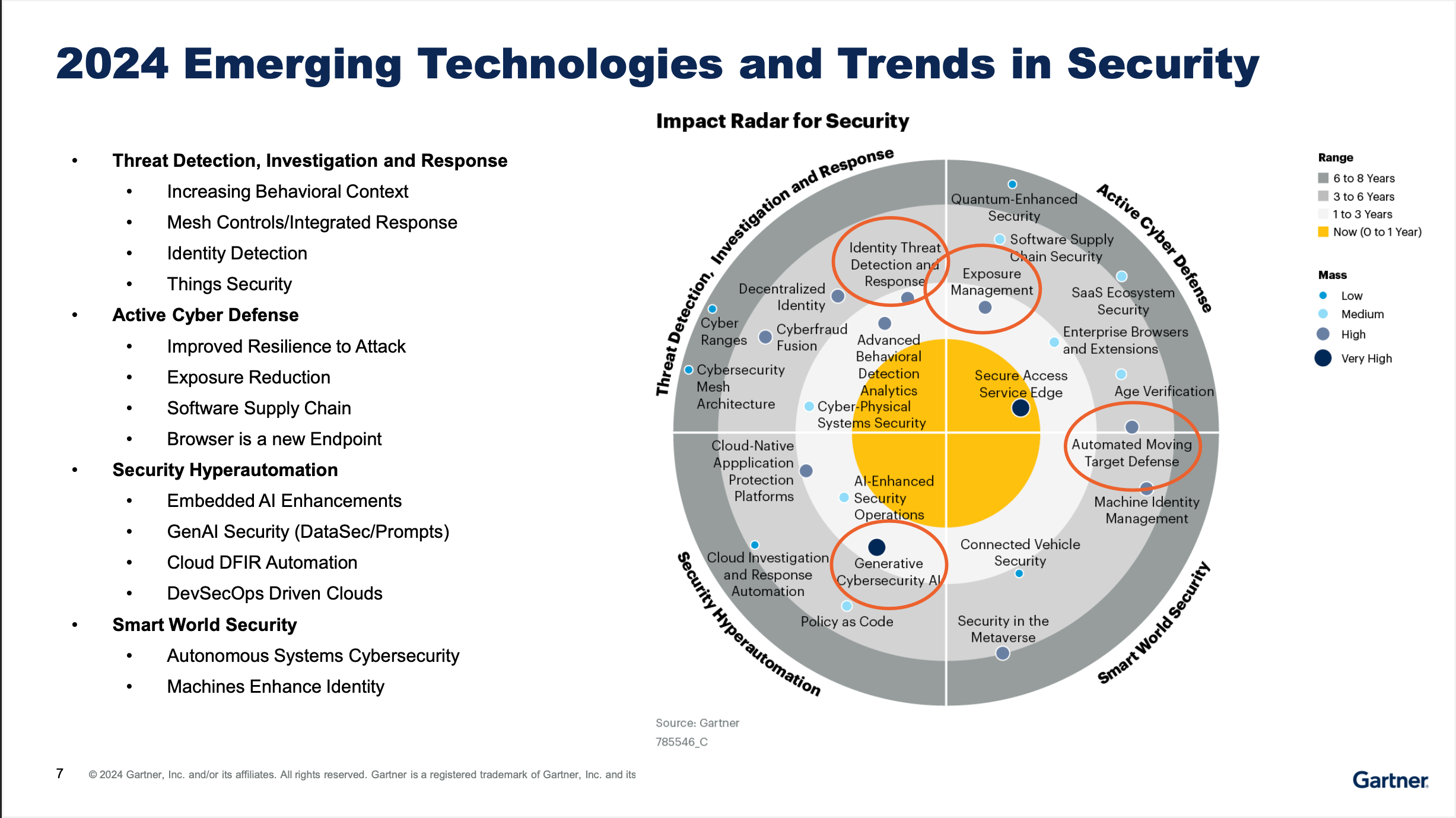Key Takeaways
- Cybersecurity jobs are in high demand, offering dynamic and rewarding career paths. (Cyber Seek, 2024)
- Cybersecurity job descriptions vary widely, from hands on technical roles to strategic leadership positions. (McKinsey Technology Trends Outlook 2024)
- Cybersecurity job requirements include strong technical skills, continuous learning, and adaptability.
- Roles like cybersecurity engineers and analysts are crucial in protecting organizations from cyber threats.
- Cybersecurity companies seek professionals with expertise in areas like network security, cloud security, and risk management.
The first question we must answer is "What is Cybersecurity?". In the new digital epoch, cybersecurity is a way of securing the very foundation of technology-driven industries since it helps protect information systems from theft, damage, and unauthorized access. With the growing threats and ever-changing landscape, the demand for professionals continues to be on the rise, leading to dynamic and rewarding careers in the industry.

What is the career of cyber security?
The career of cybersecurity is focused on protecting computer systems, networks, and data from cyber threats such as hacks, viruses, and other forms of cyberattacks. These professionals in this particular line of duty typically employ several strategies and tools to contribute to identifying and preventing security vulnerabilities within an organization's digital infrastructure.
Examples of valued cybersecurity roles are: Security Analysts implement measures to safeguard systems from breaches; Penetration Testers test systems for vulnerabilities; Security Engineers design and construct secure networks; Chief Information Security Officers are responsible for overseeing and setting direction for implementing an organization's overall security strategy.
These represent only a few of the focused positions across a wide selection of available positions in cybersecurity.
These specialists operate at the crossroads of financially sensitive industries such as finance, health care, government, and retail.There is little regard for the lengthy and diversified job description, running from setting up firewalls and encryption programs to making regular audits of systems and responding to emergencies. Cybersecurity careers involve technical skills, but at the same time, it involves continuous education and adaptability to meet the fast pace of change in cyber threats.
This field offers many opportunities for growth and specialization, and among those interested in technology and security, a base is created for promising job opportunities.
Is cyber security a good career?
Yes, cybersecurity is a very nice career choice.
The sector offers a wide range of job titles and responsibilities, accommodating various skill sets and interests. Starting from Cybersecurity Consultants and Incident Response Managers to Vulnerability Assessors and Compliance Auditors, the career options are endless.
It mirrors the dynamics and continuous evolution of cyber threats, requiring a strong workforce that has a comprehensive skill set with a commitment to continuous learning.
This field is offered with various opportunities accompanied by competitive salary packages and a high demand for the employees, together with a high growth potential. Here's why:
- High Demand: According to Forbes, an Economic estimate from the U.S. Bureau of Labor and Statistics says that in 2032, the growth will be about 31.5 percent faster than the average for all occupations. This huge demand casts the magic of job security and provides ample opportunities for promotion.

- Competitive Salaries: On issues of cybersecurity, there are Salary advantages at different levels. For example, the security analyst, a mid-level position, has an average salary reaching $120,360 yearly, while that of chief information security officers is way above $200,000 for senior positions based on location and industry.
Salaries in cybersecurity in Europe are competitive and easily vary upon countries, levels of experience, and job titles. Here's a breakdown:
Germany: The average salary for a Cyber Security Analyst in Germany is approximately €52,944 per year, with entry-level positions starting around €40,000 and more experienced roles reaching up to €80,000 annually.
UK: A CISO among the highest positions in cybersecurity can have anything from £120,000 to £300,000 on a yearly basis. The mid-level staff, for instance, the Security Analysts, normally draw an annual salary between £50,000 to £90,000.
- Diverse Career Paths: Numerous other careers fall under the cybersecurity equation—for instance, finance, healthcare, government, and technology, all present opportunities for professionals. In addition, one can also specialize in areas such as network security, penetration testing, cryptography, or incident response. Diversity in all the above ways can make one find his or her fitting place as per the skills and interests.
- Impactful Work: Working in cybersecurity provides an opportunity to protect organizations and individuals from cyber threats, hence making it highly effective and rewarding.
Featured resource:
Cybersecurity Certification Roadmap: Step-by-Step Guidance
What are the career options in cybersecurity?
This field of cybersecurity is very vast and full of careers to be explored. Some of them are security analysts, penetration testers, security architects, security engineers, incident responders, forensic experts, CISOs, and security consultants.
The role of this profession involves the design of secure networks, protection of an organization's systems and data from cyber threats, responding to breaches, and advising on security best practices.
That means that they are cross-functional roles across the cybersecurity spectrum, from the hands-on technical roles to leadership strategic roles.
Cybersecurity Job Requirements
The following is a breakdown of the key cybersecurity job titles, by focus areas, along with some details about their job requirements and fields of focus:
1. Security Analysis and Operations
- Cybersecurity Analyst
- Security Analyst
- Incident & Intrusion Analyst
- Information Security Analyst
- Cyber Crime Analyst
Focus: These roles focus on detecting, preventing, and handling security incidents.They monitor networks for security breaches, probe for security incidents to analyze the threats, and come up with recommendations to improve the security stance of an organization.
Requirements:
- Excellent analytical and problem-solving skills.
- Knowledge of security protocols and tools, such as firewalls and IDS/IPS.
- Experience in threat detection and incident response
- Relevant certifications include CompTIA Security+, CISSP, etc.
2. Security Engineering and Architecture
- Cybersecurity Engineer
- Security Systems Engineer
- Network Security Engineer
- Cybersecurity Architect
Focus: These are roles that focus on designing, implementing, and managing security solutions. They zero in on the development of secure networks, developing the security architecture, and seeing to it that information systems are intact. This engineering and architectural aspect is handled by engineers and architects who work on both the hardware and software ends of cybersecurity.
Requirements:
- Network Security and System Architecture Expertise
- Experience in security protocols, encryption, and access control systems.
- Proficiency in cybersecurity software and hardware solutions
- Certifications such as Certified Information Systems Security Professional (CISSP), Certified Information Security Manager (CISM)
3. Security Testing and Compliance
- Penetration & Vulnerability Tester
- Systems Test Engineer
- IT Auditor
Focus: It is in this category of professionals that the study and testing of security within systems, networks, and applications are done. The work of the penetration tester is to simulate a cyber attack to find vulnerabilities, while that of the information technology auditor is to check an organization's cybersecurity controls to ensure they are effective enough in her security practices and compliance with the set regulations.
Requirements:
- Sound knowledge of penetration testing tools and techniques.
- Knowledge of compliance standards (e.g., GDPR, HIPAA)
- Experience within risk assessment, vulnerability management is a must.
- Certifications like Certified Ethical Hacker, Offensive Security Certified Professional.
4. Security Consulting and Management
- Cybersecurity Consultant
- Security Consultant
- Cybersecurity Manager
- Chief Information Security Officer (CISO)
Focus: The primary responsibilities are to give advice on certain cybersecurity best practices and manage programs designed for securities. To the highest level, the consultant addresses strategic guidance of executing security measures, and the managers operationalize the cybersecurity team and strategy. The CIO has a broader perspective; he or she often heads all the operations related to IT, focusing strongly on aligning security with business objectives.
Requirements:
- The deep understanding of cybersecurity principles and strategies
- Proactive management of security projects and teams.
- Robust communication skills to advise and persuade stakeholders
- Applicable certifications, such as Certified Information Security Manager, CISSP
5. Specialized Security Roles
- Cybersecurity Specialist
- IT Security Specialist
- Software Engineer
Focus: These positions are specialized to the area of cybersecurity. Cybersecurity experts may specialize in special areas, such as cryptography or application security. IT security specialists maintain the security of IT infrastructure. Cybersecurity software engineers specialize in the development of secure software systems and applications.
Requirements:
- Specific expertise related to the role (e.g., cryptography, secure software development)
- Programming languages and frameworks expertise in security
- Experience with security assessment tools and techniques
- Pertinent certifications and advanced degrees in related areas like Master's in Cybersecurity
Every one of these groups has a specific cybersecurity aim, and the roles in them are then inherently different, each sub-command needing respective tailor-made skills and knowledge bases to be able to protect an organization's digital assets.
What skills and traits are best for cybersecurity workers?
After looking through cybersecurity job requirements of some leading global cybersecurity companies, such as Accenture and Siemens, the following in cybersecurity professionals emerged as top in the list of highly desired competencies:
- Analytical Thinking
- Attention to Detail
- Problem-Solving Abilities
- Communication Skills
- Curiosity and Continuous Learning
- Resilience and Stress Management
- Ethical Integrity
These are a must in personal skills. Let us now deal with professional ones.
Top Cybersecurity Skills in High Demand
The cybersecurity industry requires a broad range of skills, but certain areas are particularly in demand:

- Network Security: Protection of integrity, confidentiality, and availability of data moving on the network is at the heart of cybersecurity. In this connection, configuration of a network, monitoring, and securing the communication skills are in high demand.
- Cloud Security: As the cloud services adoption continues to increase, so does the demand for individuals skilled in securing cloud environments. This usually involves knowledge of cloud architecture, cloud-native security tools, and regulatory compliance.
- Penetration Testing and Vulnerability Assessment: The capability to identify the weaknesses in the systems before time through ethical hacking and vulnerability assessment is important. There will be increased demand for penetration testers who can simulate attacks and find vulnerabilities.
- Incident Response and Forensics: Incident response skills are important in ensuring the management and mitigation of the impact caused by a security breach. This would also involve forensic analysis to comprehend the nature of a breach for preventing further occurrences of such events in the future.
- Cybersecurity Architecture: Secure systems can only be built from their inception if there is sufficient knowledge on the basics of cybersecurity, risk management, and how to totally develop a security architecture.
- Risk Management and Compliance: First of these competencies will be the ability to proactively understand what is required from a regulation and how controls against such standards can be implemented. Cybersecurity professionals should be able to manage risk while complying with regulations like GDPR, HIPAA, or PCI-DSS.
- Automation and Scripting: Cyber threats are increasingly complex. As the cyber environment expands, automation is Poe tobecomes critical in managing security operations. It is then that scripting skills like in Python or PowerShell are heavily sought after for automating tasks and integrating security tools.
- Security Operations Center (SOC) Management: A management or work experience of the setting of a SOC—threat monitoring, intelligence, and response is highly preferred at larger organizations.
These skills and traits underpin the nature of cybersecurity as a multi-domain discipline, where both technical expertise and ongoing learning, supplemented by strong personal attributes, play elementary roles in professional success.
Tips for careers in cybersecurity
In establishing a successful security career, the steps one can take involve choosing a niche area related to security that interests you the most, like network security or penetration testing. Specializing in the early stages helps one stand out. One should learn different aspects of cybersecurity with increased experience in the field, and this will make you much more adaptable and valued. Networking stands very important;attending related events, joining projects, and engaging professionals are the keys that could open doors to many opportunities.
If you are new, start at the basics with courses on security fundamentals. Certifications in the line of CISSP could help in augmenting the skill sets acquired. Certifications like advanced degrees offer higher roles that are oriented toward specialization or leadership. Technical skills should be enhanced at the last mile because it is in this aspect of staying updated that one could remain competitive.
By putting these tips into practice, you set the base for a highly successful and rewarding career in cybersecurity. You will be good to go!





